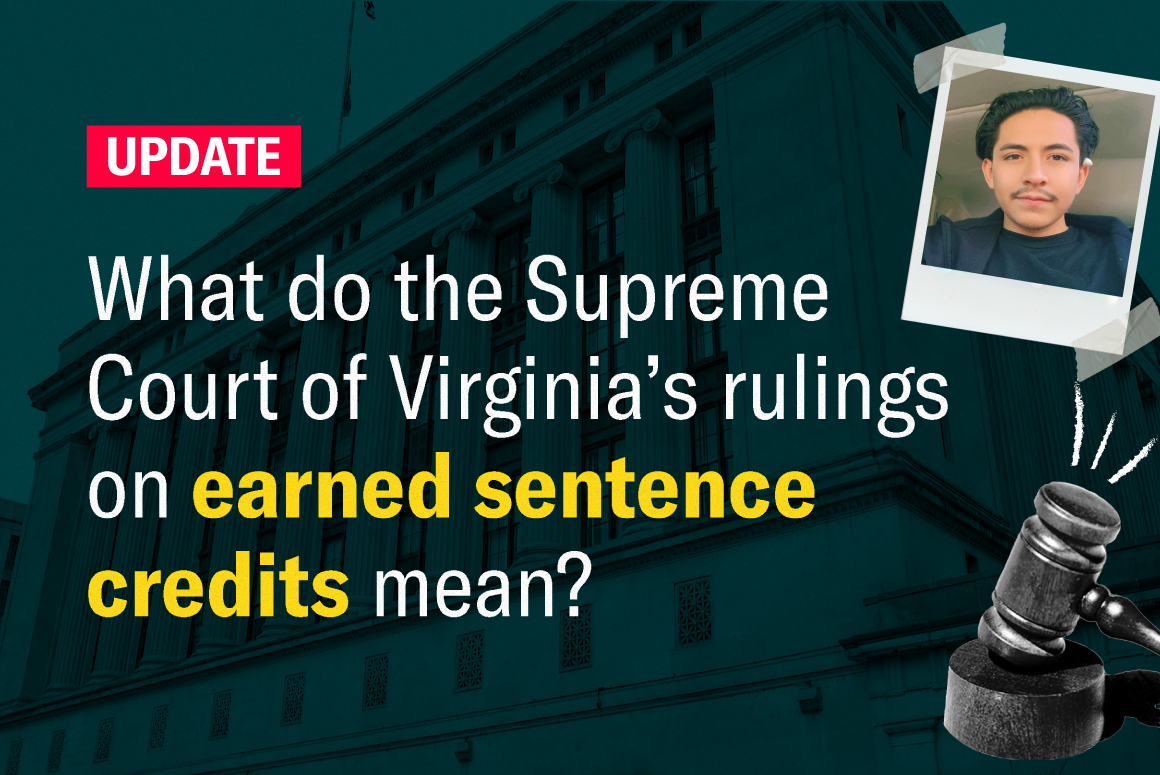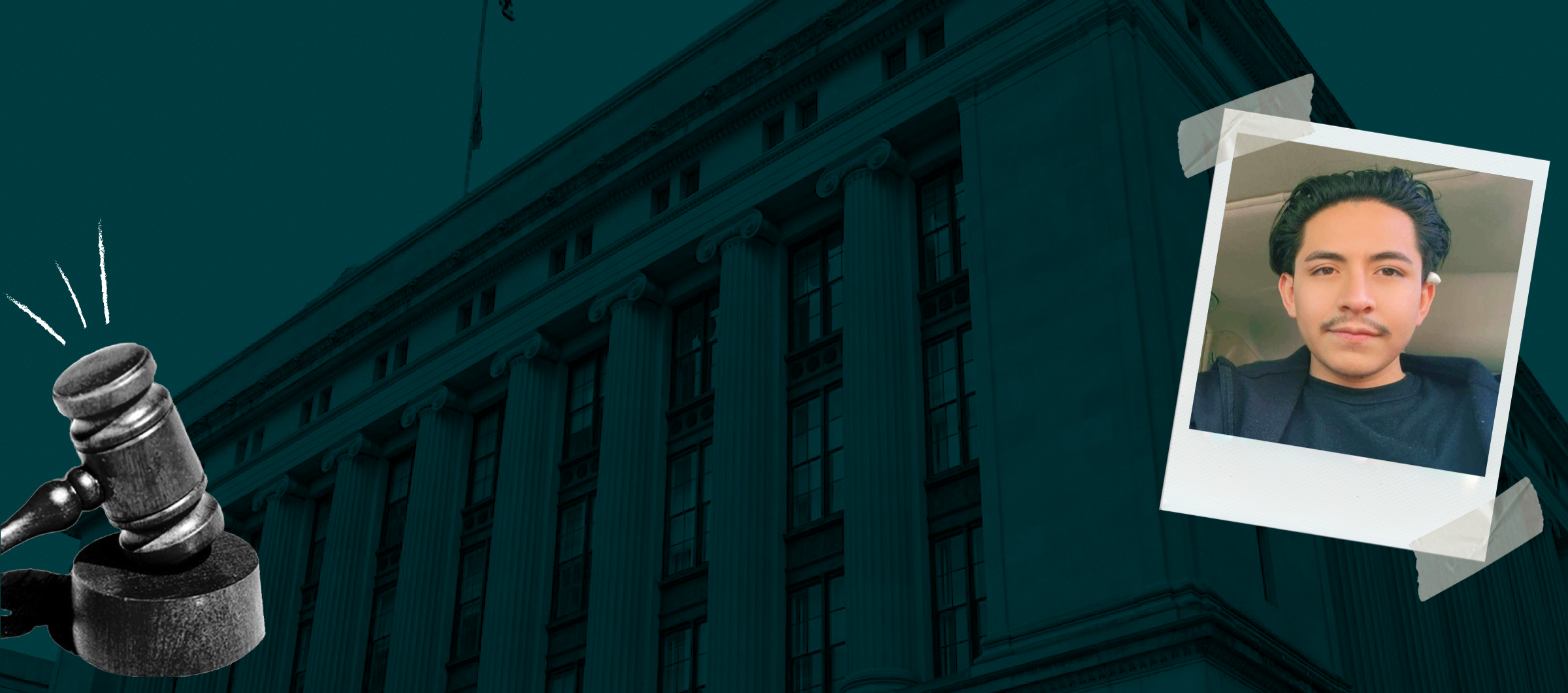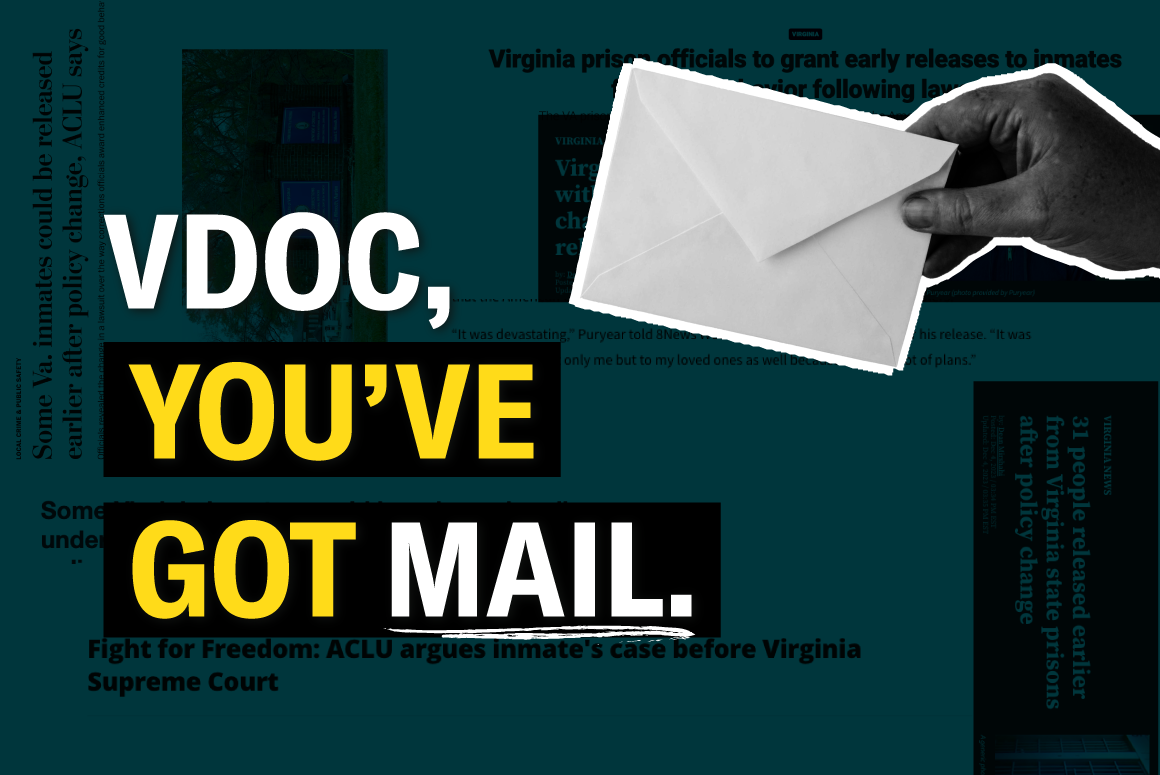On April 19, 2024, Mr. Jose Garcia Vasquez became the third ACLU of Virginia client to be released for his hard work to earn sentence credits. His release came after the Supreme Court of Virginia ruled that the Virginia Department of Corrections (VDOC) had improperly withheld sentence credits that Mr. Garcia Vasquez earned through his participation in programming and good behavior while incarcerated.
We are thrilled that Mr. Garcia Vasquez is now home with his family, including his 7-year-old daughter whom he had not gotten to see in person during his time in prison.
But Mr. Garcia Vasquez is not the only person who should benefit from the Court’s ruling. In fact, the Supreme Court of Virginia’s ruling in this case should apply to many other people currently in VDOC custody, some of whom we believe should be entitled to immediate release.
Right now, the ruling in Garcia Vasquez v. Dotson only directly applies to Mr. Garcia Vasquez. But we are demanding that VDOC restore sentence credits to everyone who is eligible for them, and to act quickly to release those who have now served their entire sentences. Keep reading for more detail on where things stand right now.
What was Mr. Garcia Vasquez’s case about?
The issue the Supreme Court of Virginia decided was whether Mr. Garcia Vasquez’s conviction for conspiracy to commit murder was eligible for additional earned sentence credits under a law passed by Virginia’s General Assembly in 2020.
With that law, Virginia’s legislature changed the earned sentence credit program to give people who demonstrate good behavior and who work to rehabilitate themselves a way to earn more time off their sentence. The law clearly listed some convictions that would not be eligible to earn those additional credits, and spelled out that people with those convictions would continue earning credits at the old, lower rate.
Some of the convictions the law listed as ineligible are what are called “inchoate offenses,” which is the legal term for attempt, solicitation, and conspiracy offenses. But not all inchoate offenses were listed as ineligible. In fact, the vast majority of them were not on that list.
Despite the clear language of the law, VDOC chose to invent its own interpretation and withhold earned sentence credits from people convicted of any inchoate offense related to one of the listed ineligible offenses (that is, an attempt, solicitation, or conspiracy to commit one of the ineligible offenses).
We thought this was contrary to both the letter and the intent of the law — so we sued.
What did the Supreme Court of Virginia do?
The Supreme Court of Virginia heard arguments on our case in January and, in April, they agreed with our interpretation of the law. The Court ruled that Mr. Garcia Vasquez SHOULD receive the additional sentence credits he had earned under the 2020 amendment to the program.
Those additional credits meant that he had served his entire sentence, so the Court ordered his immediate release.
How will this case impact my loved one?
The ruling in Garcia Vasquez v. Dotson only directly applies to Mr. Garcia Vasquez. The Supreme Court of Virginia did not explicitly say that all convictions for attempts, conspiracies or solicitations that are not specifically listed in the law should be eligible for enhanced sentence credits. Nor did the Court order VDOC to release anyone other than Mr. Garcia Vasquez.
But the reasoning the Court used in this case indicates that the ruling should apply more broadly.
The Court disagreed with each argument that VDOC made for why it had withheld earned sentence credits from our client, Mr. Garcia Vasquez. VDOC has been using those same arguments to withhold enhanced sentence credits from other people in its custody who have convictions for eligible inchoate offense.
So now, we believe VDOC must admit that withholding those earned sentence credits from people who have convictions for eligible inchoate offenses is wrong.
We believe that under the current law, there are only two groups of people who are NOT eligible for enhanced earned sentence credits:
- This ruling does not impact the eligibility of inchoate offense that are explicitly listed in the law as ineligible for enhanced sentence credits. Those offenses are still ineligible.
- This ruling does not impact people who have “mixed” sentences, meaning that they have both ineligible and eligible offenses, and are serving them concurrently or consecutively. Those people are currently ineligible for enhanced sentence credits on any part of their sentence because of language that Governor Youngkin inserted into the 2022 budget bill.
If anything about who is eligible for earned sentence credits changes, we will share that on social media. Stay up to date by following the ACLU of Virginia on Instagram, X or Facebook.
What about the ACLU of Virginia’s other earned sentence cases?
In July 2023, the Supreme Court of Virginia ruled in favor of our client, Mr. Steven Prease, in a similar case. In that case, the Court ruled that Mr. Prease’s conviction for attempted aggravated murder was eligible for enhanced sentence credits, because it was not explicitly listed among the ineligible offenses. As a result of the Court’s ruling, Mr. Prease was entitled to immediate release.
But VDOC refused to apply the decision more broadly to other inchoate offenses. So we sued again.
We filed two more lawsuits in September 2023: Mr. Garcia Vasquez’s case, and a similar case on behalf of Mr. Leslie Puryear.
Although VDOC initially opposed Mr. Puryear’s case, it quickly changed its position, and agreed that in light of the Supreme Court’s ruling in Mr. Prease’s case, convictions for attempted robbery and attempted carjacking should be eligible for enhanced sentence credits. VDOC released Mr. Puryear before the Supreme Court of Virginia could rule on his case, along with 31 other people whom it recognized had also been wrongfully denied earned sentence credits they had earned.
Back in 2022, we also challenged the governor’s budget amendment that prevented people with mixed sentences from earning enhanced sentence credits on any part of their sentence. Unfortunately, the Supreme Court of Virginia ruled against us in that case, and the ruling applies to everyone with mixed sentences.
What happens next?
We will continue to advocate for VDOC to correctly implement the earned sentence credit program in light of the Supreme Court of Virginia’s decisions in Prease and Garcia Vasquez, starting by pushing VDOC to apply these decisions to everyone with similar convictions.
In fact, after the Court’s ruling in Garcia Vasquez v. Dotson, we demanded that VDOC restore additional sentence credits to everyone who is eligible, and that VDOC act quickly to release those who have now served their entire sentences.
In both the courts and the legislature, we are fighting to make sure the General Assembly keeps the promise to incarcerated people it made in 2020. So far, we have been successful in helping to defeat proposed legislation that would have rolled back reforms even further.
If you think that you or a loved one are being wrongfully denied earned sentence credits, you should check with a lawyer as soon as possible. Although we are unable to respond to the vast majority of requests for legal assistance, we will be continuing to monitor VDOC’s implementation of this issue. If you would like to share your experience with us, submit an intake to the ACLU of Virginia at https://intake.acluva.org/.
If anything about who is eligible for earned sentence credits changes, we will share that on social media. Stay up to date by following the ACLU of Virginia on Instagram, X or Facebook.
The information provided on this website is not legal advice and is provided for informational purposes only. Information on this website may not be up to date, and readers are advised to contact their attorney for advice on any particular legal matter.
Date
Thursday, April 25, 2024 - 3:00pmFeatured image


